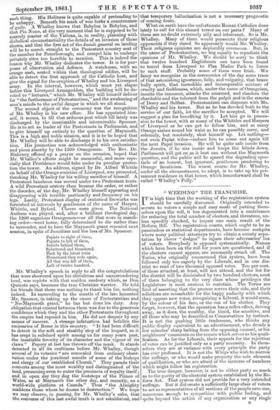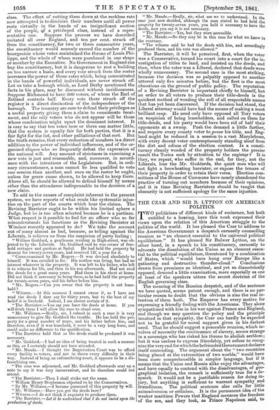" WEEDING" THE FRANCHISE.
IT is high time that the working of the registration system I should be carefully discussed. Originally intended to secure to voters a simple and easy mode of putting them- selves upon the roll, it has degenerated into a contrivance for reducing the total number of electors, and threatens, un- less speedily checked, to impair one main result of the Reform Bill. The registration courts, which ought to be as passionless as statistical departments, have become cockpits where noisy political attorneys try to obtain a county repu- tation by clever " dodges" to injure their adversaries' list of voters. Everybody is opposed systematically. Names which have been on the roll for years are questioned, and if the electors cannot appear, are summarily struck off. The Tories, who originally commenced this system, have been followed only too eagerly by the Liberals, and in one dis- trict we read of two thousand opposed votes. Ten per cent. of those attacked, at least, will not attend, and the list for the district will be diminished by two hundred electors, most of them belonging to the very, class whose privileges the Legislature is most anxious to maintain. The Tories are fond of asserting that the process serves their side, and their solicitors are remarkable for the happy audacity with which they oppose new votes, recognizing a Liberal, it would seem, by the colour of his face, or the cut of his clothes. They forget, however, that the operation has a reflex effect, driving away, as it does, the wealthy, the timid, the sensitive, and all those who may be described as Conservatives by instinct. It is not the pushing little tradesman, who thinks any public display equivalent to an advertisement, who dreads a few minutes' sharp baiting from the opposing counsel, or his neighbours' comments on the tenure which serves as his quali- fication. As for the Liberals, their appeals for the rejection of votes can be justified only as a party necessity. In them- selves they are at variance with every principle the party has ever professed. It is not the Whigs who wish to narrow the suffrage, or who would make property the sole element of qualification, or who are afraid of the increase of numbers which might follow lax registration. The true danger, however, is not to either party so much as to the purity of the electoral system established by the Re- form Act. That system did not provide for a very extended suffrage. But it did create a sufficiently large class of voters to act as representatives of all sections of the people save one, numerous enough to sympathize with public feeling, and quite beyond the action of any organization or any single class. The effect of cutting them down at the reckless rate now attempted is to diminish their numbers until all power rests virtually in the hands of an insignificant section of the people, of a privileged class, instead of a repre- sentative one. Suppose the process we have described imitated all over England, and ten per cent. struck off from the constituency, for two or three consecutive years, the constituency would scarcely exceed the number of the bourgeoisie whose votes maintained the throne of Louis Phi- lippe, and the whole of whom were purchased in one shape or another by the Executive. No Government in England can buy the constituency, but it is dangerous to rest a building on too narrow a basis, and every vote struck from the roster increases the power of those votes which, being concentrated in the hands of powerful individuals, are never struck off. Let us take a borough which, as Lord Derby mentioned the facts in his place, may be discussed without invidiousness. Suppose Richmond to have 500 voters, of whom the Earl of Zetland controls half. Every vote there struck off the register is a direct diminution of the independence of the borough. The tenantry are sure to defend their privileges as a useful property giving them a claim to considerate treat- ment, and the only voters who do not appear will be those whose combination might upset the dominant interest. It is easy to say that ten votes here or there can matter little, that the system is equally fair for both parties, that it is a fair fight for the list, and other palliations of that sort. But the truth remains, that every reduction of numbers is a direct addition to the power of individual influences, and of the or- ganized cliques who so frequently defeat the expression of the national will. Any amount of strictness in examining a new vote is just and reasonable, and, moreover, in accord- ance with the intentions of the Legislature. But, in ordi- nary circumstances, a man cannot be less qualified to vote one session than another, and once on the roster he ought, unless for grave cause shown, to be allowed to keep there. Above all, he should be allowed to defend himself by means other than the attendance indispensable to the decision of a new claim.
To add to the causes of complaint inherent in the present system, we have reports of what reads like systematic injus- tice on the part of the courts which hear the claims. The Revising Barrister ought to be within his limited sphere a Judge, but he is too often selected because he is a partisan. What respect is it possible to feel for an officer who so far misunderstands his functions as the Revising Barrister at Windsor recently appeared to do ? We take the account out of many almost as bad, because, as telling against the Liberals, it relieves us from the suspicion of party feeling : "William Goddard, a gentleman residing in High-street, was ob- hected to by the Liberals. Mr. Goddard said he was owner of free- old cottages and gardens at Spital. He had held the property by descent for twenty-seven years, and received 121. a year for it. " Cross-examined by Mr. Rogers.—It was devised absolutely to himself. It was entailed in fee. His mother was living, but had no interest whatever in theproperty. It was left to his father, who left it to witness for life, and then to his son afterwards. Had not read the deeds for a great many years. Had them in his chest at home. Did not think it necessary to bring them, as he had held the property for twenty-seven years, and his father before him.
"Mr. Rogers.—Can you swear that the property is not lease- hold ?
"Witness.—At this moment I cannot swear it, as I have not read the deeds I dare say for thirty years, but to the best of my belief it is freehold. Indeed, I am almost certain of it.
"The Barrister.—You say you have the deeds at home. If you will fetch them I will allow the case to stand over.
"Mr. Williams.—Really, sir, I submit in such a case it is very unnecessary to give Mr. Goddard the trouble. He has held the pro- perty for a great number of years, and his father before him, and therefore, even if it was leasehold, it must be a very long lease, and could make no difference to the qualification. "The Barrister held that as the deeds could be produced it was necessary. " Mr. Goddard.—I had no idea of being treated in such a manner as this, or I certainly should not have attended.
"Mr. Maude.—I thought the Registration Court was to afford every facility to voters, and not to throw every difficulty in their way. Instead of being an enfranchising court, it appears to be a dis- franchising one. "The case was adjourned, and Mr. Goddard afterwards sent up a note to say it was very inconvenient, and he therefore could not attend.
" The Barrister.—Then I shall strike out the name.
"William Henry Stephenson objected to by the Conservatives. "B Mr. Williams.—I became possessed of this property by will. "Mr. Williams.—Have you got the deeds here? " Witness.—I do not think it requisite to produce tOm.
"The Barrister.—Let it be understood that I do not insist upon the production_of deeds.
" Mr. Maude.—Really,. sir,. what are we to understand. In the case just now decided, although the man stated he had held. the property for twenty-seven years, you held it necessary to have the deeds, now you say it is not necessary. " The Barrister.—Yes, but they were accessible.
"Mr. Maude.—So they may be in this case for what we know to the contrary.
"The witness said he had the deeds with him, and accordingly produced them, and his vote was allowed."
The Barrister, it will be perceived, first, when the voter was a Conservative, turned his court into a court for the in. vestigation of titles to land, and insisted on the deeds, and then, when the voter was a Liberal, declared that deeds were wholly unnecessary. The second case is the most striking, because the decision was so palpably opposed to another uttered only five minutes before, but the first is the most obnoxious on the ground of public policy. The reputation of a Revising Barrister is important chiefly to himself, but an order to all voters to produce their title-deeds is the quickest method of weeding the roll of all respectable names that has yet been discovered. If the decision had stood, the Liberal attorney would have bad the means of making a most brilliant coup. He need only have opposed all Tory voters on suspicion of being leaseholders, and called on them for title-deeds, and his party would have been rid of half their opponents at a swoop. Push the demand a little further, and require every county voter to prove his title, and Eng- land might be reduced in a session to a vast Marylebone, with every decent voter contemptuously standing aloof from the dirt and odium of the election contest. Is a consti- tuency cleanly weeded of the property holders the precise result the Tories seek by attention to the registy ? It is they, we repeat, who suffer in the end, for they, not the Liberals, lose the Mr. Goddards, the quiet men who will not fight a browbeating barrister, or expose the tenure of their property in order to retain their votes. Election com- mittees of the House of Commons have nearly abandoned the practice of turning out members because of their opinions, and it is time Revising Barristers should be taught that obscurity is not sufficient apology for the same injustice.































 Previous page
Previous page